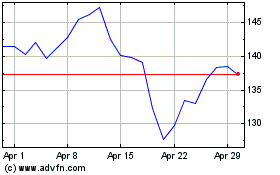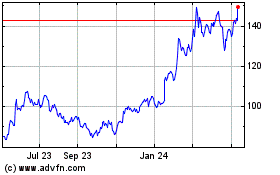Intel Completes Acquisition of Altera
December 28 2015 - 5:10PM
Dow Jones News
Intel Corp. on Monday completed its biggest-ever acquisition, a
deal that underscores Chief Executive Brian Krzanich's plan to use
new tactics to expand the chip maker's business.
The $16.7 billion purchase of Altera Corp. makes Intel, known
for microprocessors used in computers, the second-largest maker of
chips that can be programmed after they leave the factory. Altera's
chips are used in an assortment of devices that include networking
equipment, a field that Intel has targeted recently.
But Intel's more pressing priority is continuing to serve the
computing needs of giant Web services like Facebook Inc., Google
Inc. and Microsoft Corp. that rely on the company's Xeon
processors. That is becoming more difficult to accomplish through
Intel's traditional practice of squeezing more transistors on each
piece of silicon.
Microsoft and others, seeking faster performance in tasks like
Web searches, have experimented with augmenting Intel's processors
with the kind of chips sold by Altera known as FPGAs, or field
programmable gate arrays. Intel's first product priority after
closing the Altera deal is to extend that concept.
The Santa Clara, Calif., chip giant, which announced the Altera
deal at the end of May, has said it plans in 2016 to begin selling
products with a Xeon chip and an Altera FPGA in a single package.
But Mr. Krzanich has promised to pack traditional processor and
FPGA circuitry onto one chip, bringing still greater performance
benefits.
Wendell Brooks, Intel's vice president in charge of mergers and
acquisitions, estimated that the first approach can bring a 30% to
50% speed improvement over using processors and FPGAs separately.
Integrating the two functions, which won't occur until after 2016,
can double or triple the performance, he said. That combination, he
said, should bring dramatic benefits for jobs like facial
recognition, where computers may have to search through hundreds of
millions of images to find matches.
In a different vein, Mr. Brooks said, integrating Intel's tiny
Atom chips with FPGAs could also help the company in new areas such
as automobile electronic systems, where the ability to reprogram
chips could bring new features to vehicles even after they have
been sold to consumers.
Intel is betting that its production technology can help bring
such integrated products to market quickly. At the same time, it
intends to improve Altera's products with the goal of taking sales
from longtime rival Xilinx Inc.
"The biggest impact of the deal is the way Intel can bring its
manufacturing process to the FPGA business," said Mark Hung, an
analyst with Gartner Inc.
Intel plans to let Altera operate as a new business unit that
will keep the Altera brand and some operations that are foreign to
Intel. Though future Altera chips will be made in Intel factories,
for example, existing products will continue to be manufactured by
Taiwan Semiconductor Manufacturing Co.
The unit, called the programmable solutions group, also will
continue to deliver some products that use processor designs
licensed from ARM Holdings PLC. Intel has long fought—largely
unsuccessfully—to displace ARM chips from smartphones in favor of
its mainstay x86 processor technology.
"We are going to support and develop ARM-based products, just as
Altera did historically," Mr. Brooks said.
Linley Gwennap, a Silicon Valley chip analyst who heads a firm
called the Linley Group, said the Altera deal illustrates Mr.
Krzanich's willingness to try new approaches in search of growth
beyond the slowing market for PC chips.
Another sign is a series of recent senior executive hires from
outside Intel, which has tended to promote from within the
company.
In November, Intel recruited longtime Qualcomm Inc. executive
Venkata "Murthy" Renduchintala to run the company's largest
businesses. Mr. Krzanich recently estimated that about 40% of his
direct staff is new to the company.
"It's a big change for them," Mr. Gwennap said. "I really get
the feeling that Brian wants to shake things up."
Most of Altera's roughly 3,300 employees will remain in their
current jobs or be encouraged to find other positions at Intel, Mr.
Brooks said. One who won't stay is John Daane, Altera's chief
executive. The new unit will be run by Dan McNamara, a longtime
Altera executive.
Write to Don Clark at don.clark@wsj.com
(END) Dow Jones Newswires
December 28, 2015 16:55 ET (21:55 GMT)
Copyright (c) 2015 Dow Jones & Company, Inc.
Taiwan Semiconductor Man... (NYSE:TSM)
Historical Stock Chart
From Mar 2024 to Apr 2024

Taiwan Semiconductor Man... (NYSE:TSM)
Historical Stock Chart
From Apr 2023 to Apr 2024
